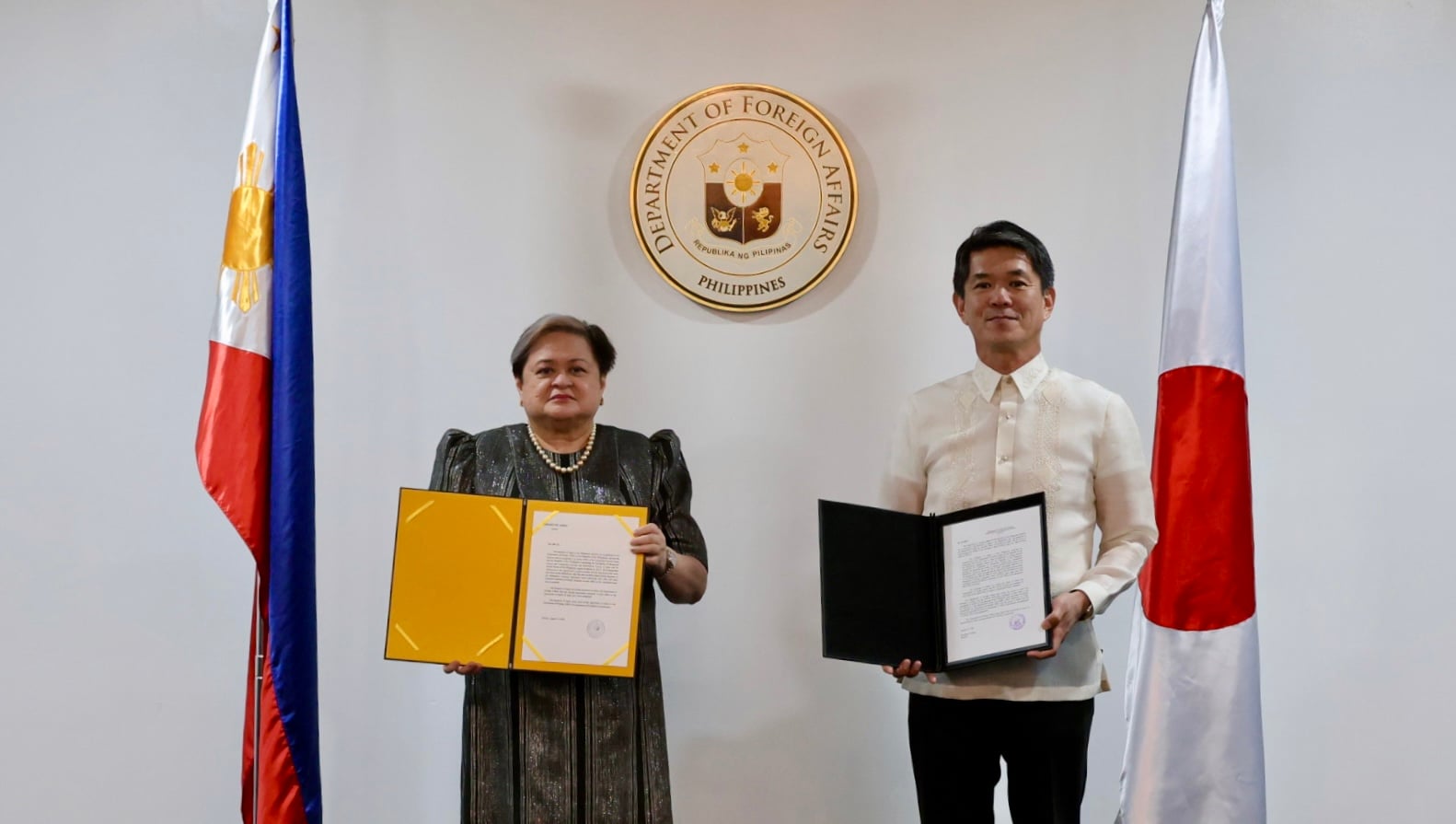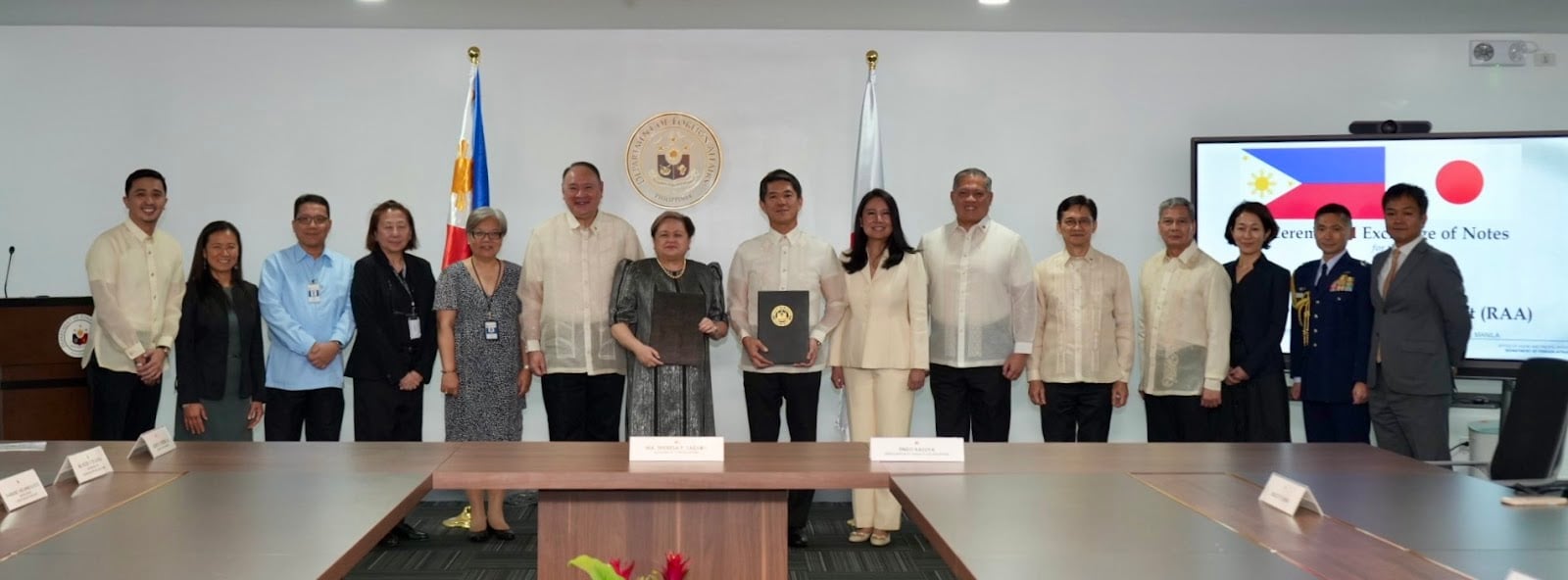

MANILA, Philippines – The Philippines and Japan announced on Tuesday the early entry into force of the Japan-Philippines Reciprocal Access Agreement (RAA) on 11 September 2025, as a response to the “urgency and strategic value” both nations attach to its security and defense cooperation.
The announcement was made during the ceremonial Exchange of Notes in Pasay City, headed by Department of Foreign Affairs (DFA) Secretary Ma. Theresa Lazaro, Japanese Ambassador to the Philippines ENDO Kazuya, and National Defense Secretary Gilberto Teodoro, Jr.
“Thirty days from now, pursuant to Paragraph 2 of Article 29, the RAA will enter into force. Not only will it be an important step in our concerted efforts to enhance our sixty-nine years of bilateral relations, it will also signify Japan’s clear commitment to the Philippines’ efforts to advance our defense capabilities in support of the Philippines’ firm assertion of its sovereignty and sovereign rights in today’s fast evolving regional security landscape,” Lazaro said in her remarks.
“The RAA is a natural progression of the cooperation between the Philippine Armed Forces and the Japanese Self Defense Forces (JSDF), from active cooperation on humanitarian assistance and disaster response activities to other aspects of capability and capacity-building,” she added.
The historic military agreement provides a legal and administrative framework for the entry and departure of the defense forces, vessels, aircraft and equipment of a party from the territory of the other party, for the purpose of training and conducting activities mutually agreed upon by the parties, the DFA explained.
The RAA was signed in Manila on 08 July 2024, on the sidelines of the Philippines-Japan Foreign and Defense Ministerial Meeting or 2+2. The Philippine Senate concurred in the ratification of the RAA on 16 December 2024.
Meanwhile, the House of Councillors of the Japanese Diet (parliament) approved the RAA on 6 June 2025 in line with their domestic procedures, the DFA added.
“Following its approval by the Philippine Senate in December of last year, the RAA was approved by the Japanese Diet early June. We are pleased to announce that, with the exchange of Note
Verbales today, the RAA will officially enter into force on 11 September 2025. This swift and decisive progress speaks to the urgency and strategic value both our nations attach to our security and defense cooperation,” Ambassador Kazuya mentioned.
“Amid the challenging security environment, the RAA provides a practical framework for mutually beneficial defense cooperation by facilitating mutual visits of our forces for joint training, humanitarian assistance, and disaster response. It strengthens the interoperability between our forces and affirms our mutual readiness to decisively respond to emerging challenges and opportunities,” he added.
Kazuya emphasized that the agreement goes beyond being a bilateral milestone.
“It is a momentous contribution to the realization of a Free and Open Indo-Pacific, in close cooperation with the Philippines, the United States, and other like-minded partners,” Kazuya stated.

(Photo courtesy of DFA)
Meanwhile, Defense Secretary Teodoro believes the RAA can contribute to peace, security and stability, not only in the Asia-Pacific, but in the Indo-Pacific, as well as the rest of world; and enforces a “shared purpose” to preserve the world order against destabilization and unilateral attempts to reshape it.
“At the end of the day, what it means is that our most potent instrument of national power, which is our Armed Forces and that of Japan, can work together, but not for destabilizing the world order, but a shared purpose to preserve it against unilateral attempts to reshape the world order into the selfish benefit of parties to the exclusion of others,” Teodoro said.
“It also provides deterrence for those actors who may not see things the way we do and may not share our values,” he added.
Teodoro also underscored the RAA’s role in providing resilience not just in defense, but in defense industrial partnerships, connectivity, infrastructure, technology and in knowledge, as both countries will be working with each other as close neighbors.

(Photo courtesy of DFA)
Prior to the RAA’s inception, the Japan Self-Defense Forces (JSDF) had already been participating in humanitarian assistance and disaster response (HADR) activities in the Philippines.
According to the DFA, once the RAA enters into force, their participation can now expand to facilitate cooperative activities, such as joint exercises, which will help improve interoperability between the forces of the two countries.




